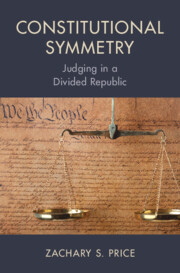Book contents
- Constitutional Symmetry
- Constitutional Symmetry
- Copyright page
- Dedication
- Contents
- Acknowledgments
- Introduction
- Part I Symmetry Explained
- Part II Symmetry Applied
- 5 Speech, Association, and Religion
- 6 Separation of Powers and Federalism
- 7 Equal Protection
- 8 Guns and Fundamental Rights
- 9 Law of Democracy
- Conclusion
- Index
5 - Speech, Association, and Religion
from Part II - Symmetry Applied
Published online by Cambridge University Press: 14 November 2024
- Constitutional Symmetry
- Constitutional Symmetry
- Copyright page
- Dedication
- Contents
- Acknowledgments
- Introduction
- Part I Symmetry Explained
- Part II Symmetry Applied
- 5 Speech, Association, and Religion
- 6 Separation of Powers and Federalism
- 7 Equal Protection
- 8 Guns and Fundamental Rights
- 9 Law of Democracy
- Conclusion
- Index
Summary
This chapter addresses symmetry’s implications for expressive freedom and religious liberty. Symmetry supports maintaining First Amendment law’s current focus on neutrality, notwithstanding emerging critiques that this approach lacks a strong historical foundation and unduly limits governmental regulation of offensive or dangerous ideas. At the same time, symmetric interpretation counsels against expanding the emerging “First Amendment Lochnerism” that threatens to extend constitutional protections for free expression into areas of economic and workplace regulation. A preference for symmetry also supports protecting religious groups, when possible, through more general protections for freedom of expressive association rather than through religion-specific constitutional doctrines. Although religious liberty may once have been a symmetric principle, today religion-specific protections risk placing constitutional law on one side of a fraught political divide over religion’s place in public life.
Keywords
- Type
- Chapter
- Information
- Constitutional SymmetryJudging in a Divided Republic, pp. 115 - 144Publisher: Cambridge University PressPrint publication year: 2024

